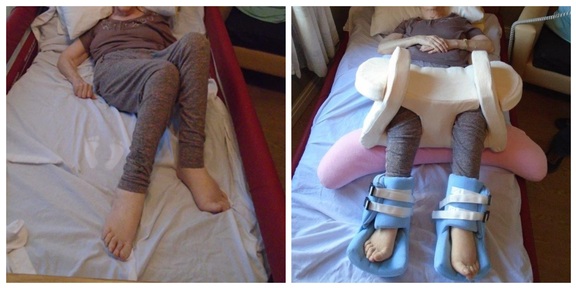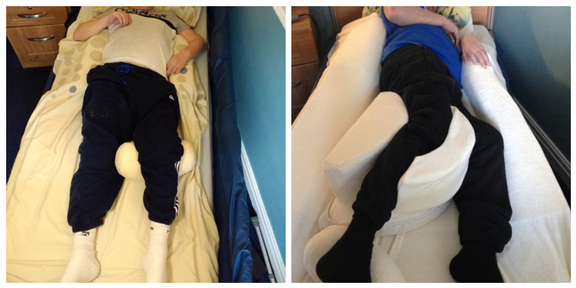Night-time positioning reduces care home residents' pain medication
Sleep positioning has been found to improve the quality of life and reduce pain medication for people with conditions such as Parkinson’s, rheumatoid arthritis, asthma and dementia.

Spending long periods of time laying down in one position can cause problems with breathing, digestion and circulation, and can negatively affect mood, but a new study has shown that night time positioning aids can help to alleviate these effects.
The research was carried out by The University of Salford with residents at Four Season Health Care’s Cameron House Care Home in Bury.
Carol Bartley, lecturer in occupational therapy from the University of Salford, said: “Many health professionals use this equipment and have been calling for research into the effect it has on adults with complex needs, but this is the first time that any serious analysis has been carried out. We’ve found the effects have been considerable across a wide range of factors.”
The study involved 12 residents and looked at factors such as pain levels, sleep quality, choke risk, skin health, oxygen levels in the blood, food and drink intake and overall mood. A personal prescription for the night time positioning equipment was made for each resident over a duration of 12 weeks. All colleagues at Cameron House helped to support the study, with five completing equipment training.
Positioning aids consisted of specially designed pillows and support systems to take pressure off the body, to make sleeping more comfortable and to prevent residents from rolling into harmful positions.
The results showed significant improvements to residents’ quality of life, including improved sleep for 70 per cent of the participants. Almost two thirds reported less pain and the remaining 40 per cent had no pain, including a resident amputee who no longer experienced phantom pain in his leg by the end of the study.
Pain medication (analgesia) was reduced or discontinued in 40 per cent of the participants, while asthma medication was also discontinued for one participant by the end of the study.
Depression was decreased by almost a third, with colleagues reporting more social engagement in the day amongst the residents involved, such as taking part in activities and games and better interactions when relatives came to visit.

Food and fluid intake was also improved with half of the residents gaining weight, along with choke risk, including one participant who started the study requiring continuous assisted feeding while seated/lying in bed, but by week twelve was able to sit unaided and feed himself bacon on toast and drink a cup of tea.
Lead nurse at Cameron House, Craig Priestly said: “The study was a fantastic success benefiting residents and colleagues and further integrating the home with the community. We put residents at the heart of everything we do at Four Seasons Health Care and valuable research such as this helps to improve future care practice and give residents a better quality of life.”
Melanie Stephens, senior lecturer in adult nursing at Salford University added: “The training also had a positive impact on staff at the home, highlighted in their confidence and ability to apply their new knowledge and skills in recognising postural requirements of new residents to the home.”
Although similar studies have been carried out with children, this is the first of its kind with adults. Researchers are now calling for more research to be carried out into the effects of the equipment on a wider group including younger adults.
click here for more details or to contact Cameron House Care Home
Latest Innovative Care News
 13-May-19
'Pink drink' brain cancer treatment rolled out across NHS in memory of Baroness Jowell
13-May-19
'Pink drink' brain cancer treatment rolled out across NHS in memory of Baroness Jowell
 25-Apr-19
Louis Tomlinson helps 83-year-old who lost wife to dementia complete bucket list
25-Apr-19
Louis Tomlinson helps 83-year-old who lost wife to dementia complete bucket list
 22-Mar-19
UK's top care home handyman takes residents to pub for pie and pint
22-Mar-19
UK's top care home handyman takes residents to pub for pie and pint
 12-Feb-19
Michael McIntyre's jokes tested to see if they stop elderly catching flu
12-Feb-19
Michael McIntyre's jokes tested to see if they stop elderly catching flu
 07-Jan-19
'We were lucky to find it': Family's delight as care home is rated Outstanding
07-Jan-19
'We were lucky to find it': Family's delight as care home is rated Outstanding